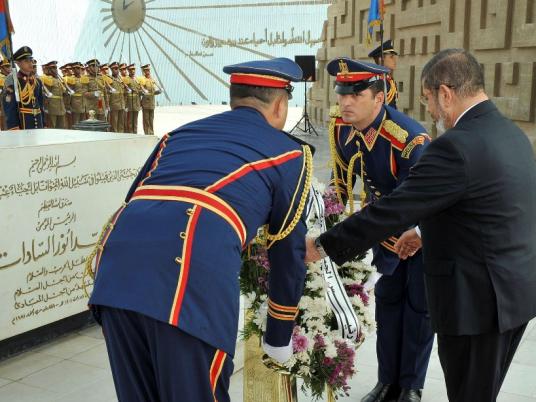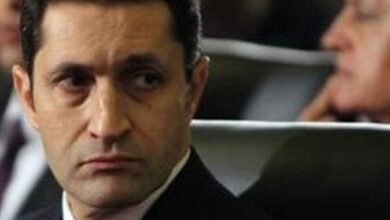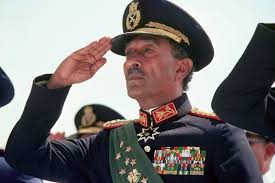
A widely circulated video showing hardline Sheikh Mahmoud Shaaban condoning the killing of opposition members on Egyptian Salafi channel Al-Hafez has triggered outcry from activists and prompted fears that the country is headed deeper into civil strife.
Other Islamist groups have also recently called for the deaths of certain protest groups and opposition supporters. Last week, a Jihadist organization and Jama'a al-Islamiya said members of the elusive Black Bloc, a group of masked protesters that have not made their agenda clear, should be killed.
The Wednesday assassination of Tunisian Chokri Belaid, a left-wing lawyer who spoke out against religious radicals, has only made matters worse.
Egypt's recent history of political assassinations is primarily confined to a brief period in the 1990s when radical Islamist groups targeted political officials and cultural icons. Before that, there were several high-profile killings, most notably the shooting of then-President Anwar Sadat.
The following are some of the key political assassinations and attempts in Egypt's modern history:
1910: Coptic Prime Minister Boutros-Ghali was assassinated by a young man named Nassef al-Wardani. Historians say he was assassinated for political and not religious reasons. The prime minister had close links with the British and had extended their concession to the Suez Canal. In addition, he was the head of a court set up by the British occupation that tried farmers in Denshway village over the killing of two British officers in 1906. Boutros-Ghali had found the four Egyptians guilty and then ordered their execution.
1945: Ahmed Maher Pasha was assassinated, also due to his close associations with the British. He was severely criticized after announcing that Egypt was joining the Axis Powers in World War II. He was said to be loyal to Jewish people and a follower of the British.
1946: Amin Osman, former finance minister in the Wafd Cabinet and a prominent Anglophile politician, was assassinated by a clandestine group that included Anwar al-Sadat. He and other members of the secret group were tried in court, with Sadat found not guilty.
1948: Assassinations for religious motives began with two major political murders conducted by members of the Muslim Brotherhood. The first was the assassination of Judge Ahmed Khazendar, who sentenced Muslim Brotherhood members to prison in March 1948. The second was the assassination of Prime Minister Mahmoud Fahmy Nokrashy, who was killed in front of the Interior Ministry in December that same year after he dissolved the Muslim Brotherhood and confiscated its money.
1949: Hassan al-Banna, the founder of the Muslim Brotherhood in Egypt, was killed by an unknown faction. However, according to historians, King Farouk played a role in his assassination.
1977: Minister of Endowments Mohamed al-Dahaby, was abducted and assassinated by an Islamist group led by Shokry Mostafa known in the media as the Excommunication and Exodus Group.
1981: President Anwar Sadat was assassinated on 6 October 1981 while watching a military parade commemorating the eighth anniversary of the 1973 Arab-Israeli War.
1987: A radical Islamist group carried out two failed attempts on the lives of secular anti-Islamist journalist Makram Mohamed Ahmed and Interior Minister al-Nabawy Ismail.
1990: Refaat al-Mahgoub, parliament speaker, was killed by Jama'a al-Islamiya member Safwat Abdel Ghany. He was sentenced to five years in prison for possessing guns and explosives, but was found not guilty of murder due to a lack of conclusive evidence. In December 2012, President Mohamed Morsy appointed Ghany to the Shura Council.
1992: Farag Fouda, a secular writer, was assassinated by two members of Jama'a al-Islamiya. Abdel Shasi Ahmed Ramadan was sentenced to death and was executed, while Mohamed Abo al-Ela Abd Rabo was sentenced to 15 years in prison and released in 2006. Last year, Abd Rabo appeared in a TV show saying he doesn’t regret killing Fouda.
1994: Prominent writer and Nobel Prize winner Naguib Mahfouz was stabbed in his neck by two young men over his controversial novel "Awlad Haretna" (Children of our Alley), which they said propagated atheism.
1995: A failed attempt to assassinate then-President Hosni Mubarak was carried out at the airport in the Ethiopian capital Addis Ababa. The assassins were reportedly tried and executed by Ethiopian authorities. But last year, leaders of Jama'a al-Islamiya and its political arm, the Construction and Development Party, said that they have information that the assassins are still alive and in prison. In March of 2012, Jama'a al-Islamiya called on Egypt’s Foreign Ministry to exert political pressure to have them released.




